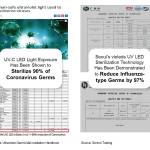- Seoul’s violeds UV LED sterilization technology has been demonstrated to reduce influenza-type germs by 97%
- Just 60 seconds of UV-C (100 – 280nm) LED light exposure has been shown to sterilize 90% of coronavirus germs
- Automakers in China are actively exploring violeds UV LED technology for vehicle interior sterilization systems
- Seoul’s violeds UV LED sterilization technology has been deployed by the US National Aeronautics & Space Administration (NASA) aboard the International Space Station (ISS)
ANSAN, South Korea--(BUSINESS WIRE)--#COVID19--Seoul Viosys, a leading global provider of UV LED technology and a subsidiary of Seoul Semiconductor, announced that customer inquiries for its violeds UV LED products, which are ideal for sterilizing bacteria, increased more than five times over the previous month, fueled by concerns over the continuing global spread of the coronavirus (COVID-19).
According to the Ultraviolet Germicidal Irradiation Handbook1, one minute of UV-C light will sterilize more than 90% of the coronavirus. In addition, tests conducted by Chinese agencies on air appliances equipped with the violeds UV LED sterilization technology have demonstrated a 97% reduction in airborne virus particles.
With the growing concerns over the global spread of the coronavirus, numerous automotive companies in China are actively reviewing adoption of Seoul’s violeds UV LED technology in sterilization systems for vehicle interiors. In addition, violeds UV LED technology has been used by the US National Aeronautics and Space Administration (NASA) aboard the International Space Station (ISS) to provide a healthy, germ-free environment for astronauts.
Seoul’s violeds UV LED technology has been adopted by Maltani, the largest Korean lighting company, for sterilization lighting applications, and by RGF Environmental Group, the No.1 in-duct air treatment supplier in the U.S., for its [Halo-LED™] indoor air quality system launched in November of 2019, as shown in this YouTube video. In addition, violeds UV LEDs are used in water purifiers from SK Magic Co., Ltd. and Hyundai Rental Care Co., Ltd.
Until recently, many companies have been conservative in their adoption of UV LED technology because conventional UV LEDs typically had a short lifetime (10,000 hours) and high cost. However, Seoul Viosys recently improved the lifetime of their violeds UV LED to more than 50,000 hours, similar to visible LEDs used for general lighting applications, and increased production capacity to achieve cost competitiveness.
“Seoul Viosys is committed to developing technology that protects human health and creates a cleaner world, and we have long been involved in developing UV LEDs for innovative biomedical and agricultural applications,” said CEO Chung Hoon Lee, CEO of Seoul Semiconductor, which established Seoul Viosys 18 years ago to develop UV-LED technology in strategic partnerships with Japanese and U.S. companies. “Through innovation, sustained research and development, and manufacturing experience, we were able to improve the lifetime of UV LEDs up to 50,000 hours and significantly reduce product cost. We hope that Seoul’s violeds UV LED technology will help protect human health and create a cleaner world in the face of the current health situation.”
Seoul Viosys is currently run by its CEO Young joo Lee, who started the company in 2002.
1 Kowalski, W. 2009.Ultraviolet Germicidal Irradiation Handbook. Heidelberg, Germany: Springer-Verlag
About Seoul Viosys
Seoul Viosys is a full-line solution provider for UV LED, VCSEL (Vertical Cavity Surface Emitting Laser), the next-generation light source for 3D sensor and laser, and a single-pixel RGB “Micro Clean Pixel” for displays. Established in 2002 as a subsidiary of Seoul Semiconductor, it captured No. 1 market share in the UV LED industry (LEDinside, 2018). Seoul Viosys has an extensive UV LED portfolio with all wavelengths range (200nm to 1600nm) including ultraviolet rays (UV), visible rays and infrared rays. It holds more than 4,000 patents related to UV LED technology. Violeds, its flagship UV LED technology, provides a wide range of industries with optimal solutions for strong sterilization and disinfection (UVC), skin regeneration (UVB), water/air purification and effective cultivation for horticulture. In 2018, Seoul Viosys acquired RayCan, a leading optoelectronic specialist, to add the advanced VCSEL technology which supports smartphone facial recognition and autonomous driving, and has started its mass production. In January 2020, it introduced a disruptive “Micro Clean Pixel” that has the potential to be a game-changer in the display market. To learn more, visit http://www.seoulviosys.com/en/.
Contacts
Seoul Semiconductor
Jeonghee Kim
Tel: +82-70-4391-8311
Email: jeonghee.kim@seoulsemicon.com
North America
Andrew Smith
Tel: (901) 831-6614
Email: andrew.smith@seoulsemicon.com
China
Cynthia Zhang
Tel: +86-157 2114 8576
Email: cynthia.zhang@seoulsemicon.com










